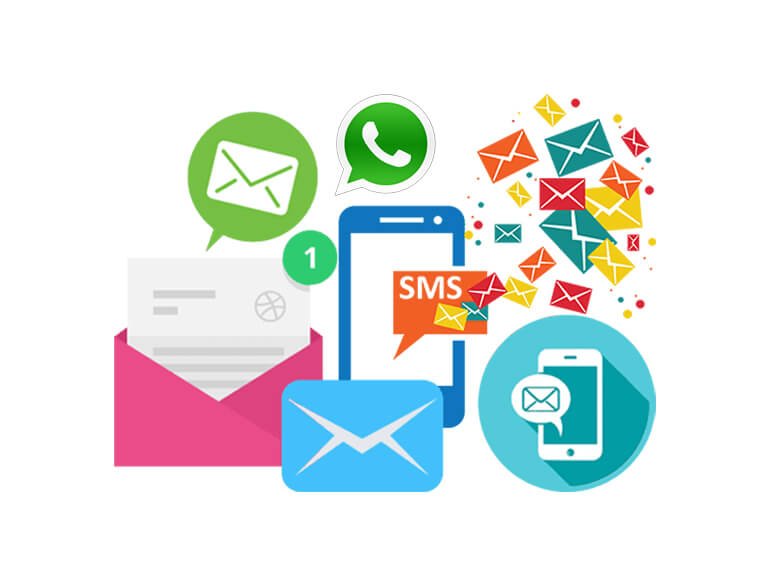Introduction
In today’s digital world, businesses are constantly looking for innovative ways to communicate with their customers. Messaging has evolved from simple text-based emails and SMS to interactive, AI-driven conversations on platforms like WhatsApp. Consumers now expect real-time, personalized, and seamless communication across multiple channels.
With the rapid advancements in technology, Email, WhatsApp, and SMS marketing has transformed into a sophisticated ecosystem of automated, targeted, and data-driven strategies. But which platform is the most effective? How are businesses leveraging these messaging tools to boost engagement and sales?
In this blog, we’ll explore how Email, WhatsApp, and SMS marketing evolve, their unique advantages, and how they contribute to business growth. We’ll also dive into future trends, omnichannel strategies, key challenges, and solutions to help marketers stay ahead in the game.
1. The Evolution of Messaging in Marketing
The way businesses communicate with customers has come a long way. Let’s take a quick look at how messaging has evolved:
- Traditional Communication: Businesses initially relied on phone calls, postal mail, and physical flyers to reach customers.
- The Rise of Email & SMS: The 1990s saw the rise of email marketing, allowing businesses to send bulk promotional messages. SMS marketing soon followed, providing an instant and direct way to reach customers.
- The Digital Shift: With the advent of social media and messaging apps, customers began demanding faster and more interactive communication.
- AI & Automation: Today, AI-driven chatbots, automated messaging workflows, and personalized marketing are shaping the future of communication.
As consumer expectations grow, businesses must adapt and integrate new messaging strategies to remain competitive.
2. The Role of Email Marketing in the Digital Era
Is Email Marketing Still Relevant?
Absolutely! Despite the rise of instant messaging apps, email marketing remains one of the most effective tools for customer engagement, lead nurturing, and sales conversion.
Key Benefits of Email Marketing:
- Cost-Effective: Email marketing has a high ROI compared to other digital marketing channels.
- Automation & Scalability: Businesses can automate campaigns for onboarding, promotions, and customer retention.
- Personalization: AI-powered email segmentation ensures customers receive relevant content.
How Email is Evolving:
- Interactive Emails: Features like AMP (Accelerated Mobile Pages) allow customers to take actions within the email.
- AI & Data-Driven Marketing: Predictive analytics help businesses send personalized content based on customer behavior.
Best Practices for Email Marketing Success:
How Brands Use SMS for Business Growth:
- Sending promotional offers, flash sales, and discount codes.
- Reminding customers about appointments, bookings, or payments.
- Enhancing customer service with automated responses and support links.
3. WhatsApp Marketing: The Rise of Conversational Commerce
Why Businesses are Moving to WhatsApp Marketing
WhatsApp has become one of the most powerful tools for businesses to interact with customers. With over 2 billion users globally, it offers an opportunity to engage audiences through interactive, two-way conversations.
Key Benefits of WhatsApp Marketing:
- High Open Rates: Messages on WhatsApp have a 98% open rate.
- Real-Time Engagement: Customers can ask questions and get instant responses.
- Rich Media & Automation: Businesses can send images, and videos, and use chatbots to automate conversations.
How WhatsApp Marketing is Evolving:
- WhatsApp Business API: Allows large-scale messaging, automation, and CRM integration.
- AI-Driven Chatbots: Enhances customer support and automates responses.
- Conversational Commerce: Enables users to browse products and make purchases within the app.
WhatsApp vs. SMS Marketing: Which is Better?
- WhatsApp is more interactive and supports multimedia, while SMS is text-based and works without an internet connection.
- SMS is great for urgent messages, while WhatsApp is ideal for personalized customer interactions.
4. SMS Marketing: Is It Still Effective?
Why SMS Remains a Powerful Marketing Tool
Even with the rise of chat apps, SMS marketing continues to be effective due to its direct and instant nature.
Key Benefits of SMS Marketing:
- Instant Reach: Messages are delivered within seconds.
- High Engagement Rates: SMS open rates exceed 90%.
- No Internet Required: Works on any mobile phone.
How Brands Use SMS for Business Growth:
- Sending promotional offers, flash sales, and discount codes.
- Reminding customers about appointments, bookings, or payments.
- Enhancing customer service with automated responses and support links.
How Brands Use SMS for Business Growth:
Enhancing customer service with automated responses and support links.
Sending promotional offers, flash sales, and discount codes.
Reminding customers about appointments, bookings, or payments.
Best Practices for SMS Marketing Success:
- Keep messages short and direct.
- Personalize messages using customer names.
- Include a clear call-to-action (CTA).
5. Why and How These Messaging Strategies Boost Business Growth
Why Messaging Marketing is Effective:
- Instant Communication: Customers receive messages in real time.
- Personalization: AI-driven data segmentation enhances targeting.
- Multi-Channel Strategy: Combining Email, WhatsApp, and SMS ensures maximum reach.
How Each Strategy Boosts Business:
- Email Marketing: Builds long-term customer relationships and enhances brand credibility.
- WhatsApp Marketing: Provides real-time engagement and drives conversions.
- SMS Marketing: Increases urgency and response rates.
6. The Future Trends in Messaging Marketing
- AI & Chatbots: Automating customer interactions for instant support.
- Omnichannel Messaging: Combining Email, WhatsApp, and SMS for a seamless customer experience.
- RCS Messaging: Enhancing SMS with rich media content.
- Data Privacy & Compliance: Ensuring marketing messages comply with regulations like GDPR.
7. Omnichannel Messaging: The Power of Integration
- How businesses can unify email, WhatsApp, and SMS marketing.
- Benefits of a seamless, cross-platform messaging strategy.
- Examples of brands successfully using omnichannel messaging.
8. Challenges and Solutions in Messaging Marketing
Common Challenges Businesses Face:
- Spam filters reducing email deliverability.
- Low engagement rates on SMS and email.
- Compliance issues with messaging regulations.
Solutions to Overcome These Challenges:
- Use AI to personalize messages and improve engagement.
- Optimize messaging frequency to prevent spamming customers.
- Ensure compliance with data protection laws.
9. Measuring Success: Analytics and Key Metrics
- Tracking email open rates, click-through rates, and conversions.
- Analyzing WhatsApp response times and engagement levels.
- Evaluating SMS delivery rates and customer interactions.
- Using A/B testing to optimize messaging strategies.
10. Future Innovations in Messaging Technology
- AI-powered voice assistants integrating with messaging platforms.
- Blockchain ensures secure and transparent messaging.
- Augmented Reality (AR) enhances customer interactions.
Conclusion & Call to Action (CTA)
Messaging marketing is no longer just about sending promotions; it’s about creating meaningful conversations that drive engagement and conversions. Businesses must embrace a multi-channel approach, leveraging Email, WhatsApp, and SMS strategically to connect with their audience effectively.
Key Takeaways:
- Email remains a powerful tool for lead nurturing.
- WhatsApp marketing enhances customer experience with real-time engagement.
- SMS marketing remains effective for urgent communication.
- AI, automation, and omnichannel strategies will shape the future of messaging.
Are you ready to enhance your messaging strategy? Start integrating Email, WhatsApp, and SMS into your marketing plan today! 🚀

